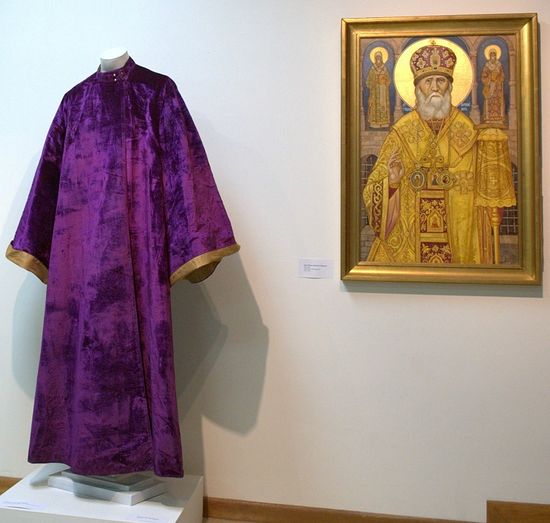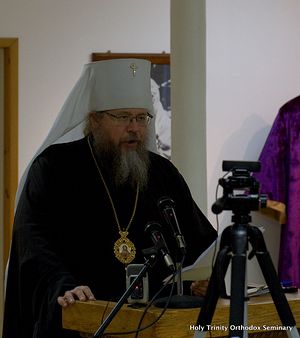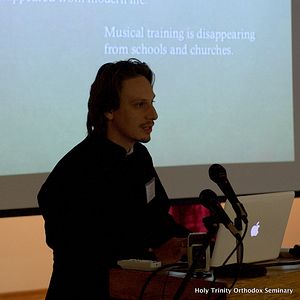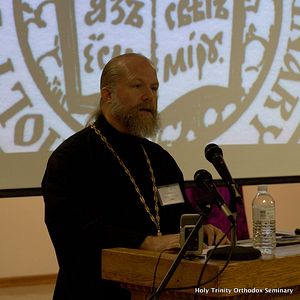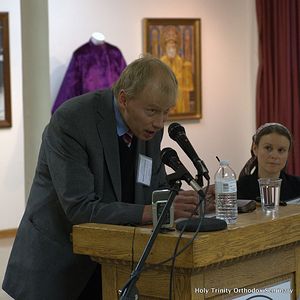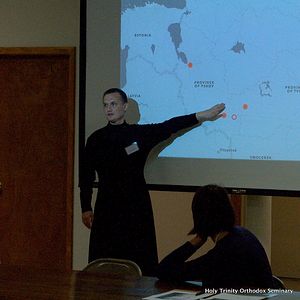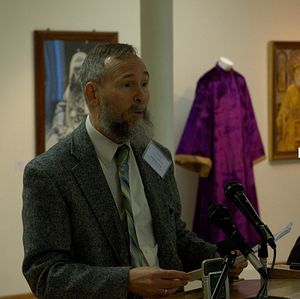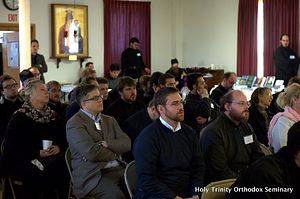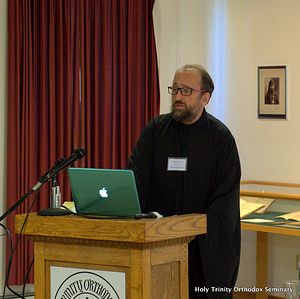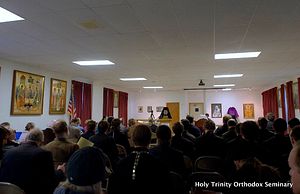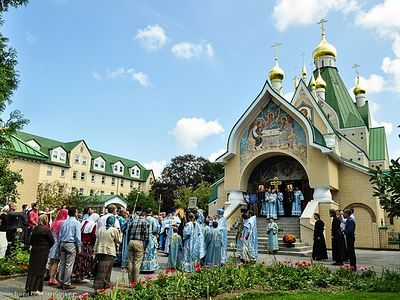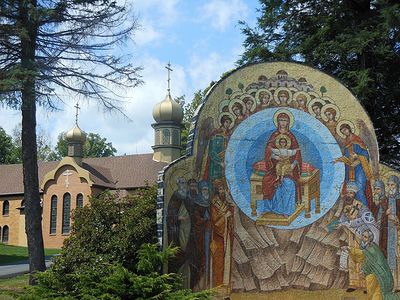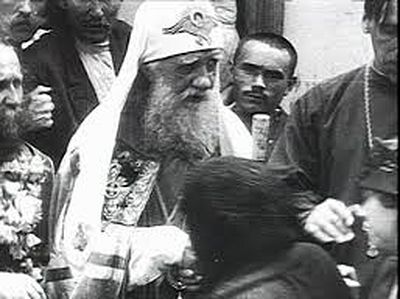Source: Holy Trinity Seminary
October 15, 2015
On Friday October 9, 2015, Holy Trinity Orthodox Seminary commenced its second annual academic symposium, entitled “Saint Tikhon, Patriarch of Moscow (1865-1925): His Life and Times.” The Symposium was dedicated to the Saint’s “double” anniversary this year: 150 years since his birth, and 90 years since his blessed repose.
With the seminary hall filled to capacity, the seminarians, professors, speakers, and visitors looked forward to two days of papers based on the remarkable life of one of the greatest Russian hierarchs of the 19th and 20th centuries. Following an opening prayer. Archimandrite Luke, rector of the seminary, passed on the words and blessing of Metropolitan Hilarion of Eastern America and New York before delivering his opening address. In his greeting, the First Hierarch of the Russian Church Abroad emphasized the significance of St. Tikhon for contemporary Orthodox Christians who live in quite a diverse and sometimes hostile environment.
The first session commenced with a paper by His Eminence Metropolitan Jonah (Washington, D.C.) on “The Legacy of Saint Tikhon as Missionary in America”, in which he addressed the unique situation of the Orthodox Church in North America, both in the time of Saint Tikhon, and today. A short break was followed by an energetic talk by independent scholar Matthew Namee (Society for the Orthodox Christian History in the Americas) on “American Orthodoxy in the Vision and Thought of Saint Tikhon,” covering the ministry of Saint Tikhon and his vision for a unified multinational American diocese under the Russian Church.
In his talk “The Directives of Patriarch Tikhon Concerning the ROCOR in the Early 1920s” Dr Andrey Kostryukov of St. Tikhon’s Orthodox University for the Humanities (Moscow, Russia) examined the consistently positive position of Saint Tikhon toward the Russian Church Abroad, in light of newly-accessible, archival documents. The first session concluded with a short address by Reader Nicholas Kotar on the work of the Patriarch Tikhon Russian-American Music (PaTRAM) Institute.
The second session opened with Archpriest Gregory Joyce’s reflections on the “Veneration of Saint Tikhon in Russia and North America,” in which he encouraged us to continue the work for the glorification of the Holy Confessor by increasing his veneration in the Church and in our prayer lives. The Dean of the Pastoral School of the Diocese of Chicago and Mid-America followed his talk with a short address about the online program offered by the Chicago School.
His talk was followed by two related papers: “Patriarch Tikhon and the Canonical Status of the Orthodox Church in Latvia and Estonia in the 1920s” by Dr. Aleksandr Gavrilin (University of Latvia, Riga, Latvia) and “The View of Saint Tikhon Concerning the ‘Ukrainian Question’ ” by Archpriest Igor Kamennyy (Kiev Theological Academy). Both scholars analyzed Saint Tikhon’s approach in dealing with the drive for independence in various parts of the Russian Church, and their effects for today. At the end of this session Reader Nicholas Chapman, Director of Holy Trinity Publications, delivered a short presentation on the recently re-published book, Chosen For His People: A Biography of Patriarch Tikhon by Jane Swan, which remains the only biography of the Patriarch in the English language.
The third session consisted of a thought-provoking paper by Francesca Silano, a Ph.D. candidate in history at the University of Toronto on “Patriarch Tikhon, the American Experience, and the Soviet State,” dedicated to Saint Tikhon’s use of the concept of freedom of conscience when dealing with the Bolshevik persecution of the Church. The session concluded with a brief presentation by Dmitry Bogdanov, Communications Manager for the Velikie Luki Diocese of the Russian Orthodox Church, whose talk on “Patriarch Tikhon’s Small Homeland” included much information on events in the diocese of Saint Tikhon’s childhood.
The second day of the Symposium began with Dr. David Ford’s paper entitled “Saint Tikhon and the Founding of Saint Tikhon’s Monastery” in which the Professor of Church History of St. Tikhon’s Theological Seminary (South Canaan, PA), detailed the endeavors of Saint Tikhon and some of his monastic clergy in establishing the first Orthodox monastery in America.
Dr. Ford was followed by the keynote address by Dr. Scott Kenworthy, Associate Professor of Miami University (Oxford, OH), which was open to the public and attracted many interested persons, including many students from University at Albany. Dr. Kenworthy’s talk, “Before the Patriarchate: The Life and Times of Saint Tikhon Before 1917,” presented a fascinating account of a less-well-known period of St Tikhon’s life and ministry, from his birth in a village of Klin (Pskov region) to his episcopal and missionary service in Western Ukraine, North America, Russia, and Lithuania. The attendees of the talk saw some unique documents and photographs, which Dr. Kenworthy discovered in the course of his continuing work on the new, scholarly biography of the saint and confessor.
The next session on Saturday began with Dr. Sergei Firsov’s analysis of “The Image and Person of Patriarch Tikhon in Soviet Press,” in which Professor of St. Petersburg State University and also of St Petersburg Theological Academy detailed the slanderous attacks made against “the enemy of the people” from the early years of the Bolshevik regime and until the fall of the Soviet Union and Communist ideology.
Deacon Andrei Psarev, HTOS faculty member and PhD candidate of Queen’s University, Belfast, in his paper, “They Have Neither Laymen Nor Money,” made an overview of previously unknown correspondence by the then-Archbishop Tikhon of Yaroslavl with the Russian Orthodox priest in London, Archpriest Evgenii Smirnov. The letters mostly consisted of conversation about the attempted entry into Orthodoxy of an English Old Catholic bishop Arnold Harris Mathew, and the resulting issues. The last paper of this session was presented by Deacon Alexander Zanemonets, a scholar from the Holy Land , detailing “The Legacy of Patriarch Tikhon in the Work of the Russian Ecclesiastical Mission in the Holy Land,” in which he covered the development of the émigré community in the Holy Land, cut off from post-revolutionary Russia, and its interactions with various figures of the diaspora Church.
The final paper that concluded the conference was given by Metropolitan Philip of Poltava, who spoke about the significance of the life of Saint Tikhon for the Russian Orthodox Church. He stated that St Tikhon was the greatest of the new hieromartyrs of Russia, due to his long- suffering under persecution by the Bolsheviks who slowly put him to death through imprisonments, the murder of his assistant, and psychological torments..
With the symposium complete, Dr. Vitaly Permiakov expressed thanks to a number of individuals without whose sponsorship and day-to-day commitment this event would not have been successful. Archimandrite Luke, Rector of Holy Trinity Seminary, concluded the proceedings by expressing thanks to the speakers, and guests who all contributed to the Seminary’s common effort to honor the memory of the great hierarch and holy confessor on his anniversary this year.
